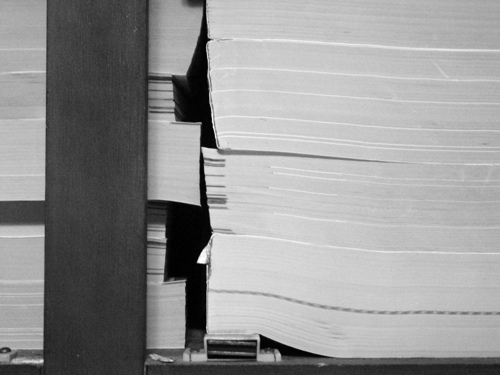
When was the last time you used the white pages? Be honest now. I, for one, can’t remember the last time I used the phone book for anything but propping open a door. And apparently I’m not alone: see these two articles and this comment string for more examples of white-pages fatigue than you can shake a stick at.
Add to the chorus the totally real, 100-percent not-made-up person in this video:
The phone lady has it right: most states still mandate universal white pages delivery. But the good news is that the tide is turning. The city of Seattle recently allowed residents to opt out of both white pages and yellow pages delivery. And sixteen enlightened states already allow phone companies to spare their customers the annual ritual of discarding an unneeded phone book: Alabama, Delaware, Florida, Georgia, Indiana, Missouri, New Jersey, New York, North Carolina, Ohio, Oklahoma, Pennsylvania, Texas, Virginia, Wisconsin, and most recently, California. And as that mix of states suggests, the appeal of ending mandatory white pages delivery crosses partisan lines; phone book laws make even the conservative Heartland Institute sound like a bunch of tree-huggers.
Looking beyond the anecdotes (and the totally real, not at all made up hidden-camera video above), there are plenty of hard numbers showing that mandatory phone book laws are a massive waste of both paper and money:
- A recent Harris Interactive survey found that most Americans don’t even use the white pages, and that 87 percent of respondents said that they’d support an “opt-in” program if they knew it would save money and protect the environment. (Of course, the survey was paid for by an internet white pages provider — but their findings are consistent with other evidence.)
- The EPA reports that only 37 percent of phone directories (by weight) are recycled. The rest are simply landfilled.
- A Gallup survey, as reported here, found that the share of households relying on stand-alone residential white pages fell from 25 percent to 11 percent, just between 2005 and 2008.
- AT&T has reported that only 3 percent of residents in Austin and Atlanta asked for the white pages after the company initiated by-request-only delivery.
So I’m kind of in the same situation as that absolutely, 100% for real guy in the video: I wish someone would just go ahead and change the law already.
Update by EdP: For more detail on the history of the law—and how we can change it—see my earlier post on the subject: Why You Can’t Stop the White Pages.
Hat tip to Jeanette Henderson for the video idea.


Comments are closed.